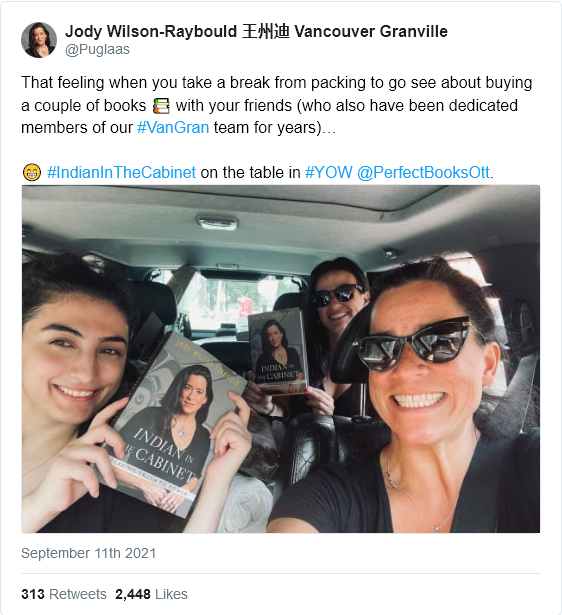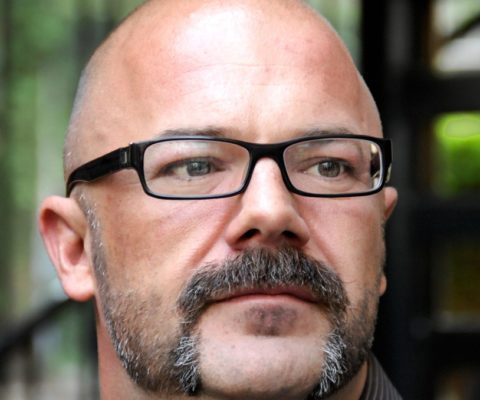World War Two
Published 13 Sep 2021Here’s an extra weekly episode for you. The suburbs of Stalingrad have fallen and the fight for the city proper is about to begin, but before it does, three conferences take place that will decide the scope, the tactics, and the strategy of this battle.
(more…)
September 14, 2021
Stalingrad, Hitler’s Obsession – WW2 – 159B – September 13, 1942
The Line‘s She-lection Bullshit Bulletin No. 4 … don’t bother questioning the timing
The latest installment of The Line‘s campaign bullshit tracker looks at the attempts by Liberal partisans to gin up some faux outrage over the timing of former Trudeau cabinet minister Jody Wilson-Raybould’s tell-all book:
First of all, we would like to specifically invite our Conservative and Liberal friends to take a few deep calming breaths and settle the fuck down about Jody Wilson-Raybould’s forthcoming book, Indian in the Cabinet, which will be out on Tuesday — but was splashed early in the Globe and Mail. The book will recount, among other things, JWR’s memories of the SNC-Lavalin scandal. The excerpt the Globe ran certainly doesn’t paint Justin Trudeau in a particularly flattering light.
But it doesn’t matter.
Seriously, our Conservative friends need to rein it in. The SNC-Lavalin affair was an example of the Liberals at their very worst; so utterly self-assured and self-righteous that any ethical or normative breach can be justified to themselves so completely that they’re genuinely shocked and offended that not everyone else buys the official story. However, alas, there’s no remaining life in this scandal. The very best-case scenario for the Conservatives is that the topic bubbling up again reminds some voters that they don’t love Trudeau, and why. But any big damage this was gonna do to Brand JT, it did literally years ago, and before the last election campaign. There are no remaining undecided voters who’ll swing based on a new book that dishes on a pre-COVID scandal.
But now to our Liberal friends, good Lord, people, chill out. We’ve seen quite a few of you, including some who ought to know better, muttering darkly about the “timing” of JWR’s book, landing as it is right before the election.
The book was announced in March, people. We all knew it was coming — so did the Liberals when they called the election. Was the book’s publication timed for maximum impact? Well, no shit Sherlocks. What, was JWR obligated to delay out of deference to the guy who kicked her out of caucus for defying him? Here’s some sage wisdom for the Libs out there: if you make enemies in politics, those enemies will eventually try to fuck you. It’s real deep stuff, we know. You’re welcome.
Meanwhile, JWR is selling books. This is what book selling is: her publisher accelerated the book’s publication date by a few weeks to land when it would have maximum public interest, and the greatest potential for earned media. JWR gets to stick it it to JT and maximize her sales before hitting the speaking circuit, where the real bucks get made.
Also, so what?
Stop gargling your own bathwater, people. We’ll read the book when it’s out, but it won’t swing the election.
Sturmgewehr MP-44 Part II: History & Implementation
Forgotten Weapons
Published 27 Sep 2016Cool Forgotten Weapons Merch! http://shop.bbtv.com/collections/forg…
The Sturmgewehr was the result of a German intermediate cartridge development program that began in the mid-1930s. It was sidelined for a period as the focus of German Ordnance shifted to full-power rifles in 8x57mm with telescopic sights, but as the German fighting in Russia became more desperate, many Ordnance officers realized that the greater firepower offered by the Sturmgewehr concept was one of the few options that might be able to allow depleted German units to effectively hold ground against Russian attacks.
To this end, the guns were issued primarily in the East, with whole companies being equipped in order to focus a maximum amount of firepower, rather than spreading the new rifles piecemeal across all units. Ultimately, of course, this was insufficient to prevent the growing Soviet advance — but for the individual German soldier, an MP-43/44/StG-44 would have been a much more comforting weapon than a Kar98k Mauser!
QotD: “In 1918 it was statistically safer for a British soldier to fight in the trenches of the Western Front than be a prisoner in Germany”
… the Kaiser’s armies behaved abysmally on the battlefields of the Great War fighting foreigners. As soon as the Germany Army crossed the border into Belgium, the atrocities began. If the sensational stories of German soldiers eating Belgian babies can be discounted as Allied propaganda, the painstaking research of Alan Kramer and John Horne, in German Atrocities, 1914: A History of Denial (2001), demonstrates beyond reasonable doubt that Germany engaged in a systematic programme of civilian executions with the purpose of striking terror into the heart of the Belgian population. On 23 August, 1914, in the city of Dinant, the German army burned down a thousand buildings and executed some 674 civilians. The oldest among them was in his 90s; the youngest was barely a month old.
On and on the German outrages went: the sinking of the Lusitania, the execution of Nurse Cavell. Of course, the Allies were not saints, but the fashionable fallacy of moral equivalence — that all sides in the Great War were as bad as each other — founders on the rocks of Germany’s treatment of prisoners of war, who became slave labourers.
This was the main substance of the British agenda at Leipzig. Almost 165,000 British soldiers were taken prisoner on the Western Front between 1914-18; by the end of 1916, almost 80% were forced into labour for the Second Reich. Prisoners were literally worked to death in salt mines. And conditions in many camps were inhuman: in Wittenberg, two water taps served 17,000 Allied PoWs. When typhus struck the camp, the German staff abandoned it and left the prisoners to die. Some 13,000 Brits perished in the Kaiser’s camps — the vast majority because of brutality, disease, malnutrition or exhaustion. But 500 British soldiers were summarily shot or beaten to death at the Kaiser’s pleasure during their detention.
Of all the German PoWs held in Britain during the Great War, 3% died; of the British PoWs held in Germany, more than 10% perished. In 1918 it was statistically safer for a British soldier to fight in the trenches of the Western Front than be a prisoner in Germany. That year, 5.8% of British PoWs in Germany died, compared to 4% of British soldiers on the battlefield.
John Lewis Stempel, “Germany’s First World War Guilt”, UnHerd, 2021-05-25.
September 13, 2021
Early Rome, Part IV: Plutarch’s Life of Numa Pompilius
Thersites the Historian
Published 5 Sep 2021In this video, we look at how the philosopher Plutarch dealt with early Rome when he covered the life and times of Numa Pompilius, the most significant of Rome’s cultural heroes.
Patreon link: https://www.patreon.com/thersites
PayPal link: paypal.me/thersites
Discord: https://discord.gg/QCaXXFr
Brave Browser: https://brave.com/noa557
Twitter link: https://twitter.com/ThersitesAthens
Minds.com link: https://www.minds.com/ThersitestheHis…
Steemit/dtube link: https://steemit.com/@thersites/feed
BitChute: https://www.bitchute.com/channel/jbyg…
“Only the most fanatical Justin Trudeau partisans will begrudge Jody Wilson-Raybould for her moment of revenge”
Howard Anglin responds to an early excerpt from former Trudeau cabinet minister Jody Wilson-Raybould:
Reading the first excerpt of her book, I did find myself occasionally cocking an eyebrow at the portrayal of a wide-eyed innocent who somehow awoke to find herself in a den of partisan thieves.
It was, after all, the Liberal Party she had joined — the most ruthless and successful vote-winning machine in Western politics this side of Mexico’s PRI — not the parish altar guild.
But setting aside questions of systemic hypocrisy and looking only at the SNC-Lavalin imbroglio, it is as clear today as it was in 2019 that Wilson-Raybould was right and Trudeau was wrong.
She was right as attorney general to rebuff political pressure to offer SNC-Lavalin a deferred prosecution agreement — a slap on the wrist that would have seen the engineering and construction company avoid criminal conviction and remain eligible for more federal contracts — and Trudeau and his office were wrong to pressure her to consider it.
Now, she is fully justified in reminding us of that fact. And if the book’s self-righteousness message is belied by the calculated timing of its release, well, she has earned the right to say “I told you so” at the time of her choosing.
As far as the election goes, the most important revelations are about Trudeau’s character.
To constitutional law nerds like me, however, the highlight is Wilson-Raybould’s disagreement with the prime minister over the role of the Attorney Genereal, including her description of a freshly briefed Trudeau expatiating scholastically on the nuances of the Shawcross doctrine before she drily punctures his condescension with the comment: “You have been talking to a lawyer.”
Coming from someone who was until a few weeks earlier “his” lawyer, at least in his capacity as head of government, the comment is doubly ironic.
Wilson-Raybould had, by her account, explained the doctrine and its implications at length to Trudeau, as well as to his principal secretary, Gerry Butts, and the Clerk, neither of whom is a lawyer but both of whom were nevertheless dispatched to try to explain their version of it to her and her lawyer chief of staff.
How Is Worcestershire Sauce Made? | How Do They Do It?
DCODE by Discovery
Published 25 Sep 2018Worcestershire Sauce was invented in 1835 when a posh army officer went to India to help run the British Empire. He fell in love, not with a woman, but with a fish sauce. DCODE how the iconic sauce is made in England today.
#DCODE, #HowDoTheyDoIt, #WorcestershireSauce
QotD: Those classic British children’s stories
England, some time in the first half of the last century. Night.
In a boarding school near the Kentish coast, a ruffian sneaks along the corridor, hunting for the rare stamp that will make him rich. In a Home Counties village, a tousled-haired schoolboy lies awake, putting the finishing touches to his scheme that will win the war for the Allies. Many miles to the north, a boat pulls away from Wildcat Island, bound for fortune and glory. And far across the oceans, a group of schoolboys tremble in terror, as their South Sea captors prepare to sacrifice them to their idol …
Such is the world of the classic British children’s story: the world of Billy Bunter and his Greyfriars chums, William Brown and his fellow Outlaws, Titty, Roger and the rest of the Swallows and Amazons, Jennings, Molesworth and the Secret Seven. For more than half a century, such stories dominated the imagination of millions of readers. You can still buy second-hand editions of Richmal Crompton’s Guillermo el Detective, and wonder what on earth readers in General Franco’s Spain made of them.
When I was growing up, the books of Frank Richards, Arthur Ransome and Richmal Crompton were still everywhere, just about. Our local library groaned with stories in which middle-class British children spent their weekends in the barn across the fields and their weeknights sneaking out of the dormitory for some stolen tuck. Raised on the virtues of teamwork and courage, the boys grew up to become hunters, naval commanders and Spitfire pilots. I never found out what happened to the girls. For a boy in the early Eighties, to have been caught reading Mallory Towers would have been social suicide.
Dominic Sandbrook, “Children don’t need woke stories”, UnHerd, 2021-05-17.
September 12, 2021
Early Rome, Part III: Livy and the Roman Tradition of Early Rome
Thersites the Historian
Published 5 Sep 2021Here, I examine Livy’s Book I with an emphasis on the tradition that he worked in and his agenda for undertaking such a massive and ambitious project.
Patreon link: https://www.patreon.com/thersites
PayPal link: paypal.me/thersites
Discord: https://discord.gg/QCaXXFr
Brave Browser: https://brave.com/noa557
Twitter link: https://twitter.com/ThersitesAthens
Minds.com link: https://www.minds.com/ThersitestheHis…
Steemit/dtube link: https://steemit.com/@thersites/feed
BitChute: https://www.bitchute.com/channel/jbyg…
Small signs of positive change in the culture wars?
Andrew Sullivan is hopeful that the small signs he mentions here are not just straws in the wind, but the beginning of a real reaction against “the Successor Ideology” among the ultra-woke cultural elite:
… both The Atlantic and The New Yorker have just published long essays that push back against woke authoritarianism and cruelty. Since both magazines have long capitulated to rank illiberalism, this is encouraging. And since critical theory is an entirely elite-imposed orthodoxy, it matters when the ranks of the elite crack a little.
Anne Applebaum links the woke phenomenon to previous moral panics and mob persecutions, which is where it belongs. She too begins to notice the obliteration of due process, individual rights, and mercy among her crusader peers:
Even if you have not been suspended, punished, or found guilty of anything, you cannot function in your profession. If you are a professor, no one wants you as a teacher or mentor (“The graduate students made it obvious to me that I was a nonperson and could not possibly be tolerated”). You cannot publish in professional journals. You cannot quit your job, because no one else will hire you. If you are a journalist, then you might find that you cannot publish at all.
Applebaum’s Atlantic piece is a good sign from a magazine that hired and quickly purged a writer for wrong think, and once held a town meeting auto-da-fé to decide which writers they would permanently anathematize as moral lepers.
Similarly, it was quite a shock to read in The New Yorker a fair and empathetic profile of an academic geneticist, Kathryn Paige Harden, who acknowledges a role for genetics in social outcomes. It helps that Harden is, like Freddie DeBoer, on the left; and the piece is strewn with insinuations that other writers on genetics, like Charles Murray, deny that the environment plays a part in outcomes as well (when it is clear to anyone who can read that this is grotesquely untrue). But if the readers of The New Yorker need to be fed distortions about some on the right in order for them to consider the unavoidable emergence of “polygenic scores” for humans, with their vast political and ethical implications, then that’s a step forward.
The profile also puts the following woke heresy into the minds of the Upper West Side: “Building a commitment to egalitarianism on our genetic uniformity is building a house on sand.” And this: “Genetic diversity is mankind’s most precious resource, not a regrettable deviation from an ideal state of monotonous sameness.” The New Yorker is also telling its readers that there are around “thirteen hundred sites on the genome that are correlated with success in school. Though each might have an infinitesimally small statistical relationship with the outcome, together they can be summed to produce a score that has predictive validity: those in the group with the highest scores were approximately five times more likely to graduate from college than those with the lowest scores.”
All of this is empirically true. But if this is empirically true, critical theory, which insists that absolutely nothing but white supremacist society leads to inequalities, is dead in the water. Refuted. Proven false by reality. Finished — even as it continues to be the premise of other countless pieces The New Yorker has run in the past few years. At some point, this will require a measure of rethinking, a moderation of the left’s absolutist blank-slatism just as the evidence is finally disproving it once and for all. The Successor Ideology, remember, holds that genetics play no role in human society, and that all inequalities are a function of the environment. Take that absolute claim away — which is to say to subject it to empirical testing — and it crumbles. And The New Yorker just took it away.
And then, in the better-late-than-never category, The Economist, the bible for the corporate elite, has just come out unapologetically against the Successor Ideology, and in favor of liberalism. This matters, it seems to me, because among the most zealous of the new Puritans are the boards and HR departments of major corporations, which are dedicated right now to enforcing the largest intentional program of systemic race and sex discrimination in living memory. Money quote: “Progressives replace the liberal emphasis on tolerance and choice with a focus on compulsion and power. Classical liberals conceded that your freedom to swing your fist stops where my nose begins. Today’s progressives argue that your freedom to express your opinions stops where my feelings begin.”
The Economist also pinpoints the core tenets of CRT in language easy to understand: “a belief that any disparities between racial groups are evidence of structural racism; that the norms of free speech, individualism and universalism which pretend to be progressive are really camouflage for this discrimination; and that injustice will persist until systems of language and privilege are dismantled.” These “systems of language and privilege” are — surprise! — freedom of speech and economic liberty. If major corporations begin to understand that, they may reconsider their adoption of a half-baked racialized Marxism as good management. Maybe that might persuade Google not to mandate indoctrination in ideas such as the notion being silent on questions of race is “covert white supremacy”, a few notches below lynching.
Hitler Finally Fed Up with his Army – WW2 – 159 – September 11, 1942
World War Two
Published 11 Sep 2021Adolf Hitler sacks Wilhelm List, Army Group Commander in the Caucasus. His replacement does not have military command experience. The fighting there is still successful this week, though, as is the advance through the suburbs of Stalingrad. The Japanese are advancing along the Kokoda Trail and on Guadalcanal, but the Axis attacks in North Africa have failed badly.
(more…)
Ocean travel without losing half the crew to scurvy
In the most recent Age of Invention newsletter, Anton Howes discusses the scurvy dogs of the Spanish Main, or any other ocean before Europeans discovered how to fight off scurvy:

An English ship of the late 16th/early 17th century: this is a replica of the Susan Constant at the Jamestown Settlement in Virginia. The original ship was built sometime before 1607 and rented by the Virginia Company of London to transport the original settlers to Jamestown.
Photo by Nicholas Russon, March 2004.
For as long as humans have suffered severe food shortages, scurvy has been known. The first record of it appears to date to ancient Egypt, in 1550BC, and it was especially familiar to the inhabitants of northern climates, with fresh vegetation every winter becoming scarce. Our word for scurvy almost certainly comes from the old Norse skyrbjugr — the skyr being a sort of soured cow’s milk that was thought to have caused the disease by going bad. In mid-sixteenth-century sources, scurvy was often referred to as though it was endemic to the Netherlands — a flat land assailed by the North Sea each winter, that had suffered long sieges and devastation thanks to the Dutch Revolt, and where fishing and merchant shipping employed an especially large proportion of the workforce. The Dutch thus had a perfect storm of factors to make vitamin C deficiencies more common, even though they abounded in fresh-caught fish and imported Baltic grain.
And so, over the centuries, the people of the northern climes had discovered the cure. Or rather, cures. The Iroquois ate the bark, needles or sap of evergreen trees — most likely white cedar, or some other kind of spruce, fir, juniper or pine, all rich in vitamin C. Their remedy saved the lives of Jacques Cartier’s colonists based near modern-day Quebec City in the winter of 1536. It’s the reason white cedar is known as arborvitae, the tree of life. And the Saami of northern Scandinavia prized cabbages and other leafy greens, in the summertime filling up casks of reindeer milk with crowberries and cloudberries, to be ready for winter.
[…]
Still more remedies were discovered by accident, as European ships began to range farther and farther abroad. The very first Portuguese voyagers around the Cape of Good Hope almost immediately discovered the value of orange and lemons — especially effective sources of vitamin C, as their acidity helps to preserve it. The voyage of Vasco da Gama, having been the first to round the Cape and reach the eastern coast of Africa, was then stricken with scurvy. They were only inadvertently saved when they traded with some Arabian ships laden with oranges, before landing at Mombasa. There, the ruler sent them a sheep and some sugar-cane, the gift also happening to include some oranges and lemons. Although the Portuguese couldn’t stay there long — they learned of a conspiracy to capture their ship — one of the voyagers later reported in wonder how the climate there must have been especially healthful to have cured them all.
Fortunately, at least some of the crew suspected the citrus instead. On the return journey from India, after a fatally slow three-month crossing of the Indian Ocean, some of the newly scurvy-ridden sailors asked their captain to procure them some oranges at Malindi. At least a few of the crew must certainly have been saved by this request, though perhaps the excitement of their imminent deliverance induced a few fatal aneurysms: “our sick did not profit”, was the report, “for the climate affected them in such a way that many of them died here.” By the time the fleet limped home back to Lisbon in 1499, scurvy had still managed to claim the lives of over two thirds of the original crew.
Nonetheless, the status of oranges as a scurvy wonder-cure had entered sailors’ lore. When Pedro Alvares Cabral repeated da Gama’s feat of rounding the Cape of Good Hope in 1500, his crew purposefully treated their scurvy using oranges. And by the 1560s, if not earlier, the news of the cure had spread beyond the Portuguese. Sailors from the Low Countries, on the eve of the Dutch Revolt from Spain, were said to be staving off scurvy by eating oranges in large quantities, skins and all. (Orange peel is in fact especially rich in vitamin C, so they were onto something.) Their value was certainly appreciated by the Dutch explorer Jacob Corneliszoon van Neck by the time of his second expedition to the Indian Ocean in 1598. Not long after setting out, he purchased 10,000 oranges from a passing ship off the coast of Spain, rationing them out to all his crew. And on the return journey via St Helena they were dismayed when initially “we found no oranges, whereof we had most need, for those that were troubled with the scurvy disease.”
The account of van Neck’s journey was translated into English for the first voyage of the East India Company in 1601, which may be why its commander, James Lancaster, directed his crew to drink three spoonfuls of lemon juice every morning. Lancaster doesn’t appear to have paid any special attention to oranges and lemons ten years earlier, when he first attempted the voyage, although other English mariners like the privateer Sir Richard Hawkins had in the 1590s already been extolling their virtues. We don’t know many of the details of Lancaster’s lemon juice trial, but his flagship’s crew was not entirely saved. Contrary to common report, at least a third of them had died by the time they left their first landing at Table Bay, South Africa — a proportion similar those on the other ships of his fleet, though we don’t know how many actually died of scurvy or of other causes. But upon the expedition’s return, the experience placed lemon juice firmly on the list of known scurvy cures — “the most precious help that ever was discovered against the scurvy” as the East India Company’s surgeon-general put it.
Terry Pratchett: Discworld And Beyond
QotD: The US Supreme Court’s Dred Scott decision of 1857
Scott was a slave who claimed to be free because his owners had taken him to U.S. states where slavery was outlawed; in ruling on the case, Chief Justice Roger Taney, writing for a 7-2 majority, found that Blacks were “beings of an inferior order” who, under the constitution, “had no rights which the white man was bound to respect.”
The Scott decision is now considered an important contributing cause of the U.S. Civil War, which began four years later. It proved, beyond anyone’s doubt, President Abraham Lincoln’s maxim that a sovereign nation could not survive half-slave and half-free. Northern states might be capable of abolishing slavery locally, but this “abolition” would never apply to imported slaves from elsewhere considered as property. One cannot fully understand U.S. history, never mind the progress of its law, without studying and appreciating Taney’s cruel language.
And, indeed, for the world at large, Dred Scott is an unsurpassed reminder of the distinction between law and justice, and of the limitations of a highly reverenced written constitution. Taney not only accepted the (irrefutable) argument that the constitution explicitly countenanced slavery: he wrote fawningly of the Founding Fathers as great men, “high in their sense of honour,” who could never have upheld absolute equality before the law on one hand while hypocritically denying it to Blacks in practice. The Declaration of Independence’s claim that “all men are created equal,” the ex-slaveowner Taney wrote, was never understood by anyone to include inferior races.
Abolitionists of the time saw the innate hypocrisy: the contemporary newspaper editor William Lloyd Garrison risked his life by calling the constitution “a league with hell.” But [University of Buffalo law professor Matthew] Steilen thinks it is better not to expose Black students to the details of that debate. Reading Taney’s “gratuitously insulting and demeaning” words and arguments, he tweeted, is likely to, and there is no other way to put this, injure their feelings. To inquire too deeply into the detail of slavery, and of the law that shielded it, would require Black students to “relive the humiliation” of Dred Scott.
Colby Cosh, “Another Day in a Feelings-First World”, NP Platformed, 2021-06-09.
September 11, 2021
Twenty years on
Mark Steyn‘s observations:
We shall not resume our anniversary observances today. The war is lost, at home and abroad. On the domestic front, we doubled the rate of Muslim immigration to the west and began assimilating ourselves with Islam’s strictures on freedom of expression and the like. The decade-and-a-half since the Danish Mohammed cartoons has been one long remorseless surrender on core western liberties. When a school teacher gets beheaded in the street, there is no outrage at the act, just a mild regret that he should have been foolish enough to provoke his own fate. Even the milder jests from the immediate post-9/11 era — the cartoon of the woman trying on new burqas in the changing room and wondering, “Does my bomb look big in this?” — would not be published today.
In the broader society, our rulers quickly determined that it was easier to punish us than our enemies. The post-9/11 security state surely helped soften up western populations for the Chi-Com-19 lockdowns, in which entire nations have been reduced to TSA-administered airports.
As for the war overseas, it ended with a military that can do everything except win handing the keys to Afghanistan back to the guys who pulled off 9/11 — and apologizing for the two-decade inconvenience by gifting the mullahs with some of the most expensive infrastructure on the planet plus an air force, approximately five assault rifles for every Taliban fighter, and express check-in for the forty-seven per cent of the Afghan population that apparently served as US translators.
The position of the United States is far weaker than it was twenty years ago. Around the planet, the assumption of friends and enemies alike is that the American moment is over and the future belongs elsewhere. They are making their dispositions accordingly. It is not a question of wishing “the post-American world”, but of accepting the known facts.
David Warren reposted his thoughts from the fifteenth anniversary:
A generation or more is necessary to see any large event in some historical perspective. That the fall of the Berlin Wall was a “large event” we could see immediately, but not what it portended. The political world would be transformed, but the New World Order that George Bush Senior foresaw was a mirage. Ditto with events since 9/11.
Several thousand were killed on that day in 2001 — the anniversary of the Ottoman defeat at the Gates of Vienna. This was a comparatively small number, by modern standards. The rich symbolism of this Islamist operation was lost on the West, which no longer cares for history or legend. A brilliant assault of “asymmetric warfare”, it fulfilled all of its objectives. The torch has since been passed from the more moderate al-Qaeda to the more fanatic Daesh, and will be passed again in due course. Osama bin-Laden personally lost face by being hunted down and killed like a rat, but his vision of a restored Islamic Caliphate survives him. It inspires still the young in heart and mind.
The immediate intention was to humiliate the “Great Satan”; to awaken the sleeping giant and make him blindly thrash; to goad him into self-destructive behaviour as he struck against an enemy he could neither locate nor understand. Beyond this: to expose him as a paper tiger, tilting a balance of power, and transferring initiative from the mightily-armed “Crusader” to the nimble “Jihadi”. Within the Muslim world: to show that only the radical Salafist faction could get results, could change the direction of history and, as it were, “make Arabia great again”.
As I suggested above, we are still too close to this event to grasp its full significance; but after fifteen years we in the West are in a much worse position than we were on the 10th of September, 2001. We showed, as the Islamists predicted, that we did not have the stamina to prevail, even against weak adversaries; that America and allies could only fight “Vietnams”. Our will is shaken, and to Salafist delight, we have by now expressed contrition for fourteen centuries of Christian defence against Islamic aggression. We bow respectfully, as our culture is insulted, and as versions of Shariah are imposed. In disregard of our own security, we have thrown our borders open to massive Muslim immigration. We follow, at every junction, the course of sentimentality, and adapt to the certainty of defeat. After each hit we call for grief counsellors.
On MeWe, Byron Clark reposted a transcript of the call Todd Beamer made from United Airlines flight 93 that morning:
Todd: Hello … Operator … listen to me … I can’t speak very loud. – This is an emergency. I’m a passenger on a United flight to San Francisco. We have a situation here … Our plane has been hijacked … can you understand me?
Lisa: (exhaling a deep breath to herself) I understand … Can the hijackers see you talking on the phone?
Todd: No
Lisa: Can you tell me how many hijackers are on the plane?
Todd: There are three that we know of.
Lisa: Can you see any weapons? What kind of weapons do they have?
Todd: Yes … they don’t have guns … they have knives – they took over the plane with knives.
Lisa: Do you mean … like steak knives?
Todd: No, these are razor knives … like box cutters.
Lisa: Can you tell what country these people are from?
Todd: No … I don’t know. They sound like they’re from the mid-east.
Lisa: Have they said what they want?
Todd: Someone announced from the cockpit that there was a bomb on board. He said he was the captain and to stay in our seats and stay quiet.
He said that they were meeting these men’s demands and returning to the airport… It was very broken English, and… I’m telling you…it sounded fake!
Lisa: Ok sir, please give me your name.
Todd: My name is Todd Beamer.
Lisa: Ok Todd … my name is Lisa … Do you know your flight number? If you can’t remember, it’s on your ticket.
Todd: It’s United Flight 93.
Lisa: Now Todd, can you try to tell me exactly what happened?
Todd: Two of the hijackers were sitting in first class near the cockpit. A third one was sitting near the back of the coach section. The two up front got into the cockpit somehow; there was shouting. The third hijacker said he had a bomb. It looks like a bomb. He’s got it tied to his waist with a red belt of some kind.
Lisa: So is the door to the cockpit open?
Todd: No, the hijackers shut it behind them.
Lisa: Has anyone been injured?
Todd: Yes, they … they killed one passenger sitting in first class. There’s been lots of shouting. We don’t know if the pilots are dead or alive. A flight attendant told me that the pilot and copilot had been forced from the cockpit and may have been wounded.
Lisa: Where is the 3rd hijacker now Todd?
Todd: He’s near the back of the plane. They forced most of the passengers into first class. There are fourteen of us here in the back. Five are flight attendants. He hasn’t noticed that I slipped into this pantry to get the phone. The guy with the bomb ordered us to sit on the floor in the rear of the plane … oh Jesus. Help!
Lisa: Todd … are you ok? Tell me what’s happening!
Todd: Hello … We’re going down … I think we’re going to crash … Wait – wait a minute. No, we’re leveling off … we’re ok. I think we may be turning around … That’s it – we changed directions. Do you hear me … we’re flying east again.
Lisa: Ok Todd … What’s going on with the other passengers?
Todd: Everyone is … really scared. A few passengers with cell phones have made calls to relatives. A guy, Jeremy, was talking to his wife just before the hijacking started. She told him that hijackers had crashed two planes into the World Trade Center … Lisa is that true??
Lisa: Todd … I have to tell you the truth … it’s very bad. The World Trade Center is gone. Both of the towers have been destroyed.
Todd: Oh God — help us!
Lisa: A third plane was taken over by terrorists. It crashed into the Pentagon in Washington DC. Our country is under attack … and I’m afraid that your plane may be part of their plan.
Todd: Oh dear God. Dear God … Lisa, will you do something for me?
Lisa: I’ll try … if I can … Yes.
Todd: I want you to call my wife and my kids for me and tell them what’s happened. Promise me you’ll call.
Lisa: I promise – I’ll call.
Todd: Our home number is 201 353-1073 … You have the same name as my wife … Lisa … We’ve been married for 10 years. She’s pregnant with our 3rd child. Tell her that I love her … (choking up) … I’ll always love her … (clearing throat) We have two boys … David, he’s 3 and Andrew, he’s 1 … Tell them … (choking) tell them that their daddy loves them and that he is so proud of them. (clearing throat again) Our baby is due January 12th … I saw an ultra sound … it was great … we still don’t know if it’s a girl or a boy … Lisa?
Lisa: (barely able to speak) I’ll tell them, I promise Todd.
Todd: I’m going back to the group — if I can get back I will …
Lisa: Todd, leave this line open … are you still there?
Lisa: (dials the phone) Hello, FBI, my name is Lisa Jefferson, I’m a telephone supervisor for GTE. I need to report a terrorist hijacking of a United Airlines Flight 93 … Yes I’ll hold.
Goodwin: Hello, this is Agent Goodwin … I understand you have a hijacking situation?
Lisa: Yes sir, I’ve been talking with a passenger, a Todd Beamer, on Flight 93 who managed to get to an air phone unnoticed.
Goodwin: Where did this flight originate, and what was its destination?
Lisa: The flight left Newark New Jersey at 8 A.M. departing for San Francisco. The hijackers took over the plane shortly after takeoff, and several minutes later the plane changed course – it is now flying east.
Goodwin: Ms. Jefferson … I need to talk to someone aboard that plane. Can you get me thru to the planes phone?
Lisa: I still have that line open sir, I can patch you through on a conference call … hold a mo …
Todd: Hello Lisa, Lisa are you there?
Lisa: Yes, I’m here. Todd, I made a call to the FBI, Agent Goodwin is on the line and will be talking to you as well.
Todd: The others all know that this isn’t your normal hijacking. Jeremy called his wife again on his cell phone. She told him more about the World Trade Center and all.
Goodwin: Hello Todd. This is Agent Goodwin with the FBI. We have been monitoring your flight. Your plane is on a course for Washington, DC. These terrorists sent two planes into the World Trade Center and one plane into the Pentagon. Our best guess is that they plan to fly your plane into either the White House or the United States Capital Building.
Todd: I understand … hold on … I’ll … I’ll be back …
Lisa: Mr. Goodwin, how much time do they have before they get to Washington?
Goodwin: Not long ma’am. They changed course over Cleveland; they’re approaching Pittsburgh now. Washington may be twenty minutes away.
Todd: (breathing a little heavier) The plane seems to be changing directions just a little. It’s getting pretty rough up here. The plane is flying real erratic … We’re not going to make it out of here. Listen to me … I want you to hear this … I have talked with the others … we have decided we would not be pawns in these hijackers suicidal plot.
Lisa: Todd, what are you going to do?
Todd: We’ve hatched a plan. Four of us are going to rush the hijacker with the bomb. After we take him out, we’ll break into the cockpit. A stewardess is getting some boiling water to throw on the hijackers at the controls. We’ll get them … and we’ll take them out. Lisa … will you do one last thing for me?
Lisa: Yes … What is it?
Todd: Would you pray with me?
They pray: Our father which art in Heaven
Hallowed be thy name,
Thy kingdom come, thy will be done
on earth as it is in heaven.
Give us this day our daily bread,
And forgive us our trespasses
As we forgive our trespassers,
And lead us not into temptation
But deliver us from evil
For thine is the kingdom, and the power, and the glory
Forever … Amen
The Lord is my shepherd, I shall not want …
He makes me to lie down in green pastures
He leads me beside the still waters
He restores my soul
He leads me in paths of righteousness
for His name’s sake
Yea, though I walk through the valley of the shadow of death
I will fear no evil, for thou art with me …
Todd: (softer) God help me … Jesus help me … (clears throat and louder)
Are you guys ready? …
Let’s Roll …












